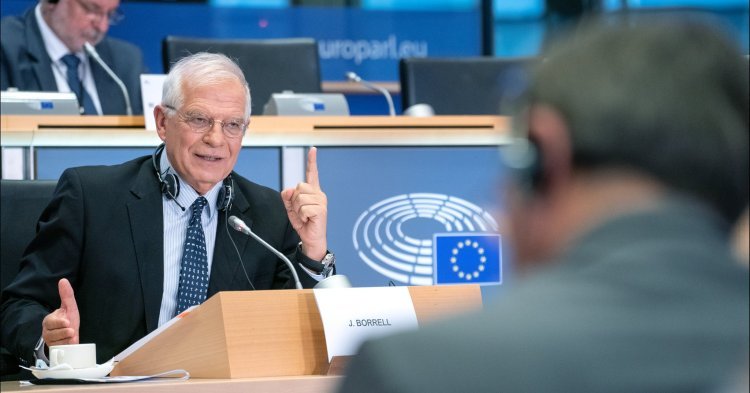Back in 2006, Solana argued that the EU was especially well-suited to deal with borderless problems precisely because solutions were beyond the reach of individual nation-states. He heralded the death of Westphalian international relations and the birth of a post-modern foreign policy.
But in the world of 2019, Westphalian power politics seem to be back. As Borrell argued, the EU is currently trying to find a role and a voice in a world where international law and the rule-based global order are being undermined. In his opening speech, Borrell talked about the state of the world – the worst, he claimed, since 1989 - and the challenges the EU faces.
Throughout the hearing, Mr Borrell stuck to an ideological line that was bound to please MEPs, describing borders as “the scars that history leaves on the land through blood and fire”, while claiming, in response to a Brexit Party MEP, that progress meant overcoming them.
Speaking the language of power In his opening speech, just as Commission President von der Leyen did, Borrell argued for a more ‘geopolitical Commission’: one that can face up to a world that “is not the world the EU wanted”. He repeated previous platitudes regarding the importance of coordination between Council, Commission, EP and the national foreign affairs ministries.
Where Borrell’s speech diverged from previous High Representative’s stances was on the issue of power. He argued that the “EU needs to learn the language of power” and to develop a strategic outlook for a world again dominated by power politics, taking advantage of its role as a normative power and deriving strength from the common commercial policy and the leverage it gives the EU. A particular issue that came up on several occasions throughout the hearing was the EU’s lack of common strategic culture. MEPs raised question about Borrell’s strategy to address this weakness.
Likewise, on defence issues, Borrell argued for a more muscular EU defence policy. Here, however, he had to tread a fine line between establishing the – obvious – need for better coordination to improve efficiency and reduce the waste of European defence expenditures and avoiding raising eyebrows in the national capitals. After all, they remain opposed to the mere creation of a European defence commissioner, regardless of the portfolio’s very limited scope.
Role of the Commissioner During the course of the MEPs’ questions, Borrell laid out his approach to the role, particularly in terms of enforcing foreign policy cohesion on sensitive topics.
Borrell’s approach seems quite different to that of his predecessors and to EU institutional orthodoxy. Rather than seeking, in his own words, a “lowest common denominator” approach to decisions, he would aim to be proactive in order to develop a common European “world vision”. Even, he claimed, if that means being in the minority within the Foreign Affairs Council.
Borrell argued for the reform the functioning of the FAC, by introducing QMV wherever the treaties allowed it - for example, on sanctions, human rights and on peace missions’ deployment. This, he stated, would be the first step in a longer process of leaving behind unanimity in foreign policy. It is important to remember, however, that this is a moot point: regardless of MEPs’ ambition, it would require an almost impossible treaty change .
A former European Parliament President himself, when asked about the EP’s role in the EU’s external action, he reminded MEPs of his role in developing the institution’s diplomacy. He also promised to further involve the Parliament in foreign policy decision-making within the (limited) role the Treaties give it.
This, however, should not be confused with a federalist approach to the EU’s external action. In his answer to Nathalie Loiseau, an En Marche MEP and former European Affairs Minister, he explicitly ruled out the ‘communitarisation’ of foreign and defence policy. Mr Borrell’s role would be to improve efficacy at the national level, through convergence between Member States, particularly on defence spending.
Balkans: A Top Priority It emerged that Borrell’s first priority as High Representative would involve the Western Balkans. Indeed, he held it unthinkable for the EU to project power at a global level without first dealing with its immediate neighbourhood.
He announced that his first trip would be to Pristina, Kosovo, in the hope that dialogue between Pristina and Belgrade would resume in order to find a solution to a territorial disagreement he labeled as “untenable”. He also indicated the importance of opening the borders within the Western Balkans as a part of his strategy to engage with the region.
However, when asked about Spain’s non-recognition of Kosovo, Borrell was non-committal, arguing that that was a national decision and that it would be best to focus on Kosovo’s recognition by large powers.
Among his other top priorities were Libya and the EU’s immediate southern neighbourhood, where he claimed he would seek more engagement, as he did with the Sahel countries.
Russia: A ‘threat’? As would be expected, Russian sanctions, engagement and containment was brought up several times during the hearing. Borrell’s answers indicated continuity with the positions advocated by his predecessor, Federica Mogherini. Sanctions ought to be maintained, but should not mean absolute Russian isolation. Instead, Mr Borrell advocated for selective engagement in issues, such as Iran, where common ground could be found.
He reiterated that the EU’s Eastern Partnership is not a strategy to isolate Russia from its immediate neighbours. In a fairly diplomatic answer to Estonian liberal MEP Mr Paet, he argued that Russia represents a strategic challenge but that sanctions cannot be a policy in themselves.
Human Rights Various MEPs from centre-left parties questioned Borrell over the role that human rights would play in his external action. In his answers to Belgian S&D MEP Maria Arena, he argued that the EU represents the global “lighthouse of human rights” and vowed to put human rights at the centre of the EU’s external action, demanding their inclusion in all future trade agreements. He also promised to cooperate with the EP’ promotion of human rights across the world.
When MEPs asked Mr Borrell about female empowerment and the lack of gender equality at the helm of the External Action Service, he defended the importance of gender and female empowerment in diplomacy and even in military deployment. On the issue of female representation at the top of EEAS, Mr Borrell was more timid, arguing that gender parity was unreachable by the end of his mandate, citing the issue of secondments.
Altogether, and despite questions over past statement and a thirty thousand euro fine for insider trading, Mr Borrell’s hearing went relatively smoothly. In order to assuage fears among MEPs he promised, that if necessary, he would sell his remaining stock options the very next day.
Borrell lastly called for a more muscular foreign policy, with a more defined strategy which allows the EU to look the world’s great powers in the face. This is the assertiveness MEPs like to hear, and it is therefore unsurprising that Mr Borrell was greenlighted by the committee. Whether, at a time of fundamental disagreements between Member States, he will be able to deliver on those objectives, is of course a different story.


Follow the comments: |
|
